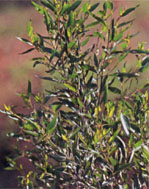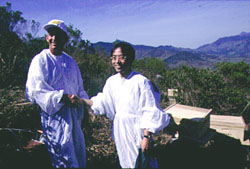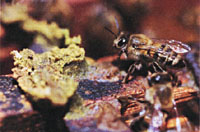The
propolis gathered from the new buds
of medicinal plants contains many useful ingredients.

Cláudio
Mota's apiary comprises a natural herb farm filled with an
abundance of wild herbs.
|
|
Here in Brazil's highlands, at 1,500 meters above sea level, a vast herb
garden spreads out before me. This treasure trove of medicinal plants
is found in a quiet, natural environment completely unlike the jungles
for which Brazil is best known. Busily flying around this wild herb garden
collecting propolis are the bees. This propolis collection site is Yamada
Bee Farm's Brazilian partner farm, located 400 kilometers from Sao Paulo.
All of the herbs in this stretch of land are wild. "For rosemary alone
I believe there are more than a dozen varieties out there," explains Cláudio
Mota, the farm's director. Rosemary is widely used in cosmetics and known
for its analgesic and anti-inflammatory properties. Honeybees produce
propolis to keep bacteria out of their hives, but propolis made from medicinal
plants can also have a beneficial effect on human health.
As we talked, Cláudio Mota displayed his vast knowledge of medicinal
herbs. Much of that knowledge has been handed down since ancient times
through the indigenous culture, but Cláudio Mota also draws on
his knowledge as a medical doctor and his clinical experience using herbal
medicine.

Mountains
covered with forests of eucalyptus planted for lumber and
paper are present everywhere.
|
|
Brazil is a vast country, so the plants that grow in this
region are completely different from those that grow in the north. In
the same way that honey comes in many varieties depending on the types
of flower nectar it is made with, recent research by the company indicates
that it may be possible to find propolis with unique characteristics derived
from the vegetation of specific locales. This will result in a more useful
classification system than the overly-broad "Product of Brazil."
Cláudio Mota, who is also a leading apiarist in the region, has
a vision for the region: "This is a wonderful place where plants can grow
in abundance only because of the pure, clean air. I would therefore like
to see it become an even better apiculture center." And this dream is
shared by other nature-loving apiarists.
|








